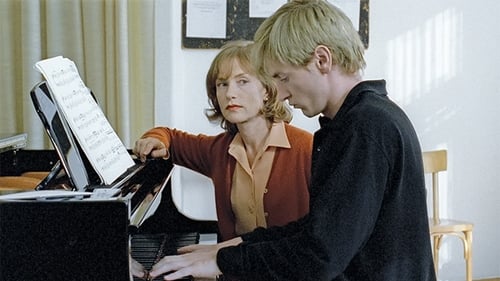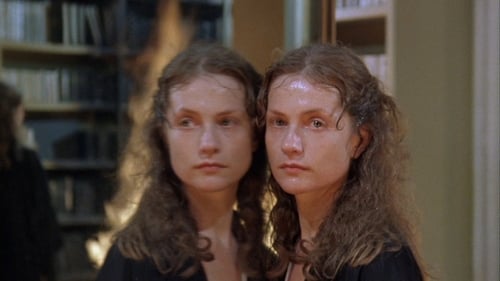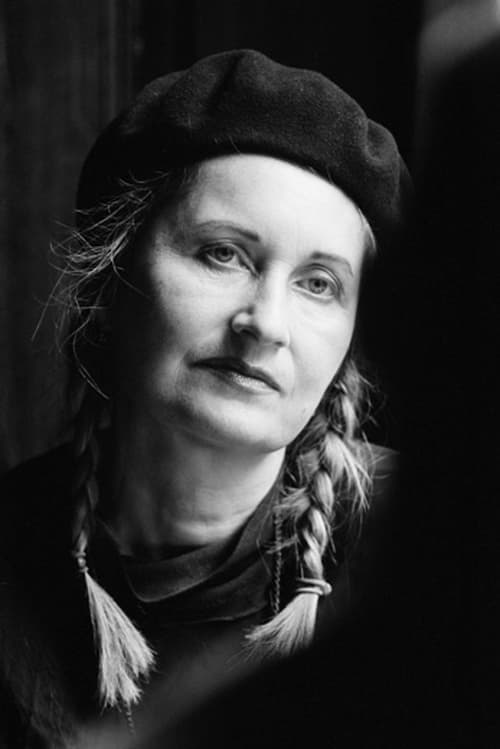Elfriede Jelinek
Рождение : 1946-10-20, Mürzzuschlag, Styria, Austria
История
Elfriede Jelinek is an Austrian playwright and novelist. She was awarded the Nobel Prize in Literature in 2004. Jelinek's output has included radio plays, poetry, theatre texts, polemical essays, anthologies, novels, translations, screenplays, musical compositions, libretti and ballets, film and video art. She has also appeared in a couple of feature films. She is probably best known for her novel "Die Klavierspielerin/The Piano Player" published 1983.

Self
Wunderkind, scandalous author, traitor to the fatherland, fury of the theater, feminist, fashion-lover, communist, pessimist, language terrorist, rebel, enfant terrible, nest fouler, brilliant, vulnerable artist, Nobel laureate. This film about Elfriede Jelinek, who in 2004 became the first Austrian author to receive the Nobel Prize for Literature, focuses on her artistic approach to language. The montage of archive material with voiceovers and interviews, some of them recently recorded, is told from Jelinek’s point of view.

Novel
О восстании мертвецов в небольшом австрийском городе.

Writer
She is the godmother of performance art. With her shocking public actions she created in the late 60s images that have burned into the general visual memory until today. The life and work of the Austrian artist Valie Export exemplify a development in art history in which women sought and found new ways and means of expression. Her work provides a feminist counterpart to the Viennese actionism of her time, which has influenced numerous artists of subsequent generations. The innovative diversity of her artistic approaches makes Valie Export an icon of 20th century art history.

Reader
She is the godmother of performance art. With her shocking public actions she created in the late 60s images that have burned into the general visual memory until today. The life and work of the Austrian artist Valie Export exemplify a development in art history in which women sought and found new ways and means of expression. Her work provides a feminist counterpart to the Viennese actionism of her time, which has influenced numerous artists of subsequent generations. The innovative diversity of her artistic approaches makes Valie Export an icon of 20th century art history.

She is the godmother of performance art. With her shocking public actions she created in the late 60s images that have burned into the general visual memory until today. The life and work of the Austrian artist Valie Export exemplify a development in art history in which women sought and found new ways and means of expression. Her work provides a feminist counterpart to the Viennese actionism of her time, which has influenced numerous artists of subsequent generations. The innovative diversity of her artistic approaches makes Valie Export an icon of 20th century art history.

Two friends, two Viennese, two poets, two unusual women. They have known each other for 30 years. Elfriede Jelinek is the better known of the two, the great author with her analytical mind and her social commitment against the whole "politician's docks." The now deceased lyricist Elfriede Gerstl remains rather tender with her poetry, although her poems do not miss a certain amount of sharpness, albeit ironically packed. When the two Elfrieden sit in their Viennese coffee house and drink the little brown, they usually talk about clothes, they talk about the fashion that Elfriede Gerstl has just collected again.

FOREIGNERS OUT! SCHLINGENSIEFS CONTAINER is a thrilling, insightful, funny chronicle and reflection of one of he biggest public pranks and acts of art terrorism ever committed. Austria 2000: Right after the FPÖ under Jörg Haider had become part of the government, the first time an extreme right wing party became state officials after WW2, infamous German shock director Christoph Schlingensief showed a very unique form of protest. Realising public xenophobia and the new hate politics in the most drastic ways possible, he installed a public concentration camp right in the middle of Vienna's touristic heart, right beside the picturesque opera where hundreds of tourists and locals pass by daily. And it was no concentration camp you had ever feared to return from the old times, but one that cynically reflected our new multimedia culture. Satirising reality TV shows, "Big Brother" especially, a dozen asylum seekers were surveilled by a multitude of cameras, could be fed and watched by.

Novel
Главная героиня Эрика — профессор Венской консерватории. Она учит молодежь дивной музыке Шуберта, сама же, будучи монстром современной цивилизации, страшно далека от гармонии небесных сфер. Она по-детски делит ложе со старой мегерой-мамашей, лишена всякого подобия личной жизни, после занятий тайно посещает порномагазины и под кроватью держит набор садомазохистских инструментов. Когда же в нее влюбляется один из ее учеников, она шокирует и его, и зрителя совершенно дикими реакциями на юношеское чувство.

Writer
A complex and enigmatic plot that evokes the life of Bachmann. The story develops around an unusual triangular relationship, a threesome between a woman of unknown name, a man named Malina and a Hungarian, Ivan, with whom she falls in love. Ivan will be his last great love, but their need for exclusivity in love is so strong that it can not be understood or matched. Malina is a struggle, a confrontation between two worlds strange and hostile.

Writer
“Writer Elfriede Jelinek has repeatedly made statements about her television-watching habits. She watches a great deal, a wide variety of what is broadcast, though rarely for pleasure or the purpose of gaining knowledge. On the contrary, the TV program is one of her favorite objects of study. Three separate times on a particular day, while sitting in a comfy TV chair, she commented on Austrian TV news for VALIE EXPORT.” – Brigitta Burger-Utzer

Dialogue

Anna's Teacher
Die Ausgesperrten revolves around an unlikely group of 4 youths in Vienna who band together, each for different reasons, to mug people. Two are fraternal twins, the third a blue-collar worker, the fourth the privileged daughter of wealthy parents who "needs a little dirt in her life". The story provides penetrating insights into the Austria of the 50s, in which some enjoyed the benefits of the "Economic Miracle", while others were shut out. It repeatedly references Austria's Nazi past and the numerous ways in which it influences the present despite the conspiracy of silence which surrounds it.

Writer
Die Ausgesperrten revolves around an unlikely group of 4 youths in Vienna who band together, each for different reasons, to mug people. Two are fraternal twins, the third a blue-collar worker, the fourth the privileged daughter of wealthy parents who "needs a little dirt in her life". The story provides penetrating insights into the Austria of the 50s, in which some enjoyed the benefits of the "Economic Miracle", while others were shut out. It repeatedly references Austria's Nazi past and the numerous ways in which it influences the present despite the conspiracy of silence which surrounds it.




